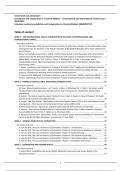Summary
Literature summary Jurisdiction and Cooperation in Criminal Matters ()
- Course
- Institution
This is the literature summary of all prescribed literature of the course jurisdiction and cooperation in criminal matters, part of the master International and Transnational Criminal Law at the UvA. This summary relates to the academic year of 2024/2025.
[Show more]



